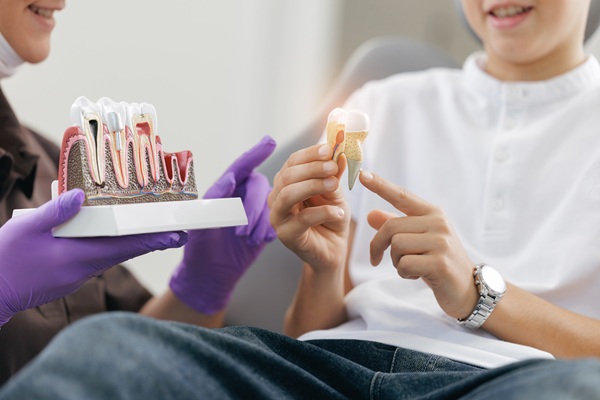Types of Denture Relining

A patient who wears a prosthetic denture will often need a relining done periodically. This is a necessary procedure that is performed to improve ill-fitting dentures as well as to extend the life of the prosthetic.
What is denture relining?
Denture relining is a procedure used to correct dentures that are no longer able to properly fit in a patient’s mouth. The process involves resurfacing the tissue side of the prosthetic and adding an extra layer of material to help fill out any empty space and reshape the dentures so they can be worn comfortably.
Why is the procedure necessary?
Improperly fitted prosthetics can cause a number of complications, with the most common being irritation, fungal infections, ulcers, sore spots, and an overgrowth of tissue. Wearing dentures that are ill-fitting can also result in speech and eating difficulties.
There are many reasons the prosthetics may not fit the way they used to and need to be relined. Improper care of dentures, changes in the gums and bones of the jaw that are common in the aging process, as well as natural wear and tear, are frequent causes. As a result, patients will need a relining done fairly often.
What are you denture relining options?
There are three main relining types that dentists use; these are known as soft, hard, and temporary relines. The following details the differences between them.
Soft reline
A soft reline is done with a softer and more comfortable material. It is often recommended for patients who have recently had new dentures fitted and those who have sore and sensitive gums and can be done in the dental office. Because the material is porous and more delicate, soft relines do not have the longevity that hard relines do. These will need to be replaced more often as they typically last around one to two years.
Hard reline
A hard reline is a sturdier option. The material, typically comprised of an acrylic that is similar to the denture base, is usually fabricated in a lab and takes longer to create than a soft reline. Hard relines often last at least two years but may last longer.
Temporary reline
A temporary reline with a medicated material may be placed temporarily to help the prosthetics fit properly and to reduce pain and gum inflammation. It is used for patients who are waiting for a hard reline or new dentures to come in.
Conclusion
Patients with dentures will often need a relining procedure due to the dentures no longer fitting the mouth properly, which can help extend the life of the prosthetics as well as make them more comfortable. It is imperative that patients who have discomfort with their prosthetics see a dentist as soon as possible. Regardless of which type of relining is chosen, patients will be able to wear dentures comfortably again and eliminate the need to have new prosthetics for a longer time.
Request an appointment here: https://beniciadentist.com or call Southampton Dental Care at (707) 887-5075 for an appointment in our Benicia office.
Check out what others are saying about our dental services on Yelp: Denture Relining in Benicia, CA.
Recent Posts
If your dentures don't fit anymore or have some missing teeth, you need a denture reline to make them fit and look good again. Denture relining is the best option if you have weak or damaged teeth that cannot be used as anchors to retain your dentures. If you have natural teeth, the dentist will…
Considering an implant dentistry procedure? Read on to learn more about this type of restoration. With implant dentistry, replacing missing teeth has never been easier, and these restorations are generally indistinguishable from natural teeth. Dentists are often asked about how implant dentistry works. Due to the innovative structure of dental implant restorations, they are far…
As an implant dentist office in Benicia, we replace missing teeth on a daily basis. We do so, with a variety of solutions, including dental bridges and dentures. While these two options have been used for years, and with positive results, both have distinct drawbacks. A dental bridge, for example, can only be placed if…
A dental implant crown is an artificial tooth that connects to the embedded post in the patient's jaw by means of an abutment. The crown is the visible part of the three-piece implant used to replace a missing tooth through a surgical procedure. The dental crowns used with implants are usually made of porcelain but…


